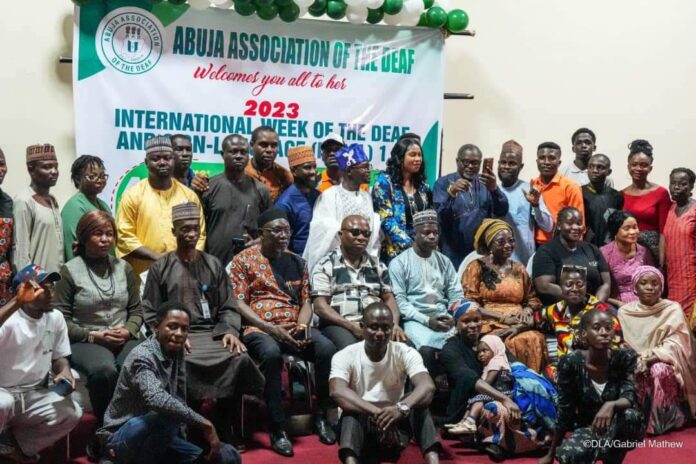Abuja Association Of The Deaf has called on government to officially recognize sign language as a national language in Nigeria.
The group made this call through their Chairman Ayoade Beiyoku-Alase in his welcome address during the occasion of The International Week Of The Deaf People And Sign-Language Commemoration held on Thursday in Abuja.
Ayoade while appreciating the guests on behalf of 9 million Deaf people in Nigeria said that the gathering is to commemorate the International Week of the Deaf and celebrate the power of sign language.
He informed that that the theme of the year is “Revolves around “A World Where Deaf People Everywhere Can Sign Anywhere.”
“This theme emphasizes the global struggle faced by the Deaf community in accessing their basic right to communication, and it calls upon us to explore the challenges we face and chart a way forward towards shaping inclusive future” he added.
“As the Chairman of the Abuja Association of the Deaf, I am aware of the obstacles that we about Deaf Individuals encounter in their daily lives. Communication barriers, misconception, and a lack of accessibility to fully participate in society. Despite the progress made in some areas, significant challenges persist, requiring dedication to address them on”.
He lamented that one of the major challenges Deaf people face is the lack of recognition and acceptance of their language known as Sign-Language.
“While sign language is the natural and preferred mode of communication for the Deaf, its recognition as an official language is still pending in many regions, including Nigeria. This negatively impacts our ability to freely express ourselves, access vital information, and fully engage in various sectors of society”.
He also said that The CRPD define sign-languages as languages that are equal language together with spoken language. The convention also outlines the rights to receive education and access to information in sign language, to have professional sign language interpreting, to accept and facilitate the use of sign languages, and to promote cultural and linguistic identity of the deaf community.
“Additionally, limited access to education remains a significant obstacle for Deaf individuals. Many Deaf children still do not access to quality education in an inclusive environment that embraces sign language as a primary mode of instruction This hinders their development, limiting their opportunities for and participation in society” he added.
He pointed out another critical challenge faced by Deaf people which is the lack of accessibility in public spaces, including government and private buildings, healthcare facilities, transportation, and employment settings.
“The absence of qualified sign language interpreters, the lack of captioning, and the absence of visual cues present significant that marginalize the Deaf community and restrict our ability to access essential services and fully exercise our rights”.
He frowned at lack of adequate representation and support in decision-making processes both local and national levels.
In order to achieve an inclusive society for Deaf Community, we urged government and non-government organizations, CSOs, and relevant stakeholders to play active role in the following:
Recognizing Sign Language: Officially recognizing sign language as a national language is fundamental to ensuring the inclusion of Deaf people in the national agenda. Governments should acknowledge sign language as an equal and legitimate means of communication, granting it the same status and recognition as any other spoken language.
Sign Language Interpreters: Providing access to sign language interpreters is essential to enable effective communication between Deaf individuals and policymakers. Governments and non-government organizations can do better to allocate resources to train and deploy sign language interpreters to various settings, including government offices, education, health facilities, public consultations, and policy development meetings.
Inclusive Policy Development: Inviting Deaf individuals and organizations to actively participate in policy development processes ensures that their unique perspectives and needs are considered. Governments and non- government should establish inclusive mechanisms that allow Deaf individuals to have a meaningful voice, assess the impact of policies on their community, and contribute to decision-making processes.
Awareness and Sensitization: Raising awareness about the importance of sign and Deaf culture among policymakers and the general public is vital. Governments and non- government organization should conduct awareness campaigns, workshops, and training programs to foster a deeper understanding of the communication needs and rights of the Deaf community.
Accessible Information: Ensuring that information related to national agendas and the SDGs is accessible in sign language is crucial for the inclusion of Deaf individuals. Governments & non-government organizations should work towards providing sign language interpretation for public announcements, policy documents, government websites, and other relevant platforms.
Collaboration with Deaf Organizations: Establishing partnerships with Deaf-led organizations and civil society groups is essential for effective inclusion of Deaf people in the national agenda and SDGs. Governments & non-government organizations should actively engage with these organizations to gather insights, learn about best practices, and collaborate on initiatives aimed at advancing the rights and participation of Deaf individuals.
Together, we can raise awareness, educate others about the importance of sign language, and advocate for the rights of the Deaf community. Let us work hand in hand to shape an inclusive future where
He ended by appreciating all their partners & the guests for their support saying that their presence demonstrates their commitment to the empowerment of the Deaf community in Nigeria.


